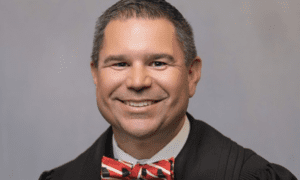The U.S. Capitol Reflecting Pool in Washington, D.C., will be aglow Sept. 29 with thousands of Lights of HOPE – lighted bags created to honor those who have survived or are fighting cancer or remember those who lost their battle with the disease.
The Fayette County Board of Commissioners has requested that two of those bags will be in memory of beloved Fayette County Commissioner Pota Coston. Fayette County will be sending two luminary bags for The Honorable Pota Coston to Washington DC, one signed by the commissioners themselves and the other which will be signed by the entire staff of Fayette County.
“The Lights of HOPE ceremony is an unforgettable reminder that we are all touched by cancer in some way, and that we need to make the fight against cancer a national priority.” said Kim Westwood, ACS CAN Lead Advocate for GA Congressional District 3. “Holding this event at the U.S. Capitol sends a clear message to our elected leaders that we need to continue working to find cures and improve the lives of cancer patients in our country.”
Westwood will be traveling to Washington DC to participate in the Lights of HOPE, and she invites residents of Congressional District 3 to be part of this poignant and moving event. All it takes is a minimum $10 contribution per bag to the American Cancer Society Cancer Action Network (ACS CAN). Contributions for Lights of HOPE can be made by contacting Kim at [email protected] or by visiting www.acscan.org/lightsofhope. When you place your order, please reference Kim by name. All bags must be arranged for by Sept. 21.
Contributions or gifts to the American Cancer Society Cancer Action Network, Inc. are not tax-deductible.
The Lights of HOPE ceremony is part of the annual ACS CAN Leadership Summit and Lobby Day, during which volunteer advocates from nearly every congressional district in the country will meet with lawmakers to discuss cancer-related issues including increasing federal funding for cancer research and supporting legislation to improve quality of life for cancer patients. To learn more about these and other issues, visit www.acscan.org.













Leave a Comment
You must be logged in to post a comment.